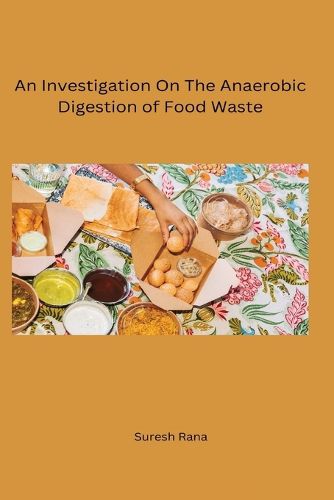Readings Newsletter
Become a Readings Member to make your shopping experience even easier.
Sign in or sign up for free!
You’re not far away from qualifying for FREE standard shipping within Australia
You’ve qualified for FREE standard shipping within Australia
The cart is loading…






This title is printed to order. This book may have been self-published. If so, we cannot guarantee the quality of the content. In the main most books will have gone through the editing process however some may not. We therefore suggest that you be aware of this before ordering this book. If in doubt check either the author or publisher’s details as we are unable to accept any returns unless they are faulty. Please contact us if you have any questions.
This study explores the process of anaerobic digestion (AD) as a sustainable method for managing food waste. The research investigates the efficiency and viability of converting organic waste into biogas through anaerobic digestion. Various parameters such as temperature, pH levels, and substrate composition are examined to determine their influence on the digestion process. The study aims to provide insights into optimizing AD systems for effective food waste management and renewable energy production.
Introduction:
Food waste is a significant global challenge contributing to environmental issues such as greenhouse gas emissions and landfill pollution. Anaerobic digestion presents a promising solution by breaking down organic matter in the absence of oxygen, generating biogas as a valuable byproduct. This research delves into the intricacies of AD, focusing on its application in treating food waste to produce renewable energy and organic fertilizers.
Methodology:
The investigation involves setting up controlled anaerobic digestion experiments using various types of food waste as substrates. Factors such as temperature variations, pH levels, and different waste compositions are manipulated to observe their impact on the efficiency of biogas production. Biogas composition and yield, along with the degradation rate of organic matter, are monitored as key indicators of the digestion process.
Results:
The results highlight the influence of different parameters on the anaerobic digestion process. Optimal conditions for biogas production, including temperature ranges, pH levels, and substrate ratios, are identified. The study demonstrates the potential for maximizing biogas yield while efficiently decomposing food waste, showcasing AD as an effective waste management technique with dual environmental benefits.
Discussion:
The findings suggest practical implications for implementing anaerobic digestion systems in managing food waste on a larger scale. The discussion delves into the economic feasibility, scalability, and environmental impact of AD, emphasizing its role in sustainable waste management and renewable energy generation. Additionally, the study explores potential challenges and opportunities for further research and development in this field.
Conclusion:
This investigation underscores the significance of anaerobic digestion as a viable and eco-friendly approach to handle food waste. The results emphasize the potential of AD systems to mitigate environmental issues by converting organic waste into valuable resources. Further advancements and optimizations in AD technology could significantly contribute to achieving a more sustainable and circular economy.
$9.00 standard shipping within Australia
FREE standard shipping within Australia for orders over $100.00
Express & International shipping calculated at checkout
This title is printed to order. This book may have been self-published. If so, we cannot guarantee the quality of the content. In the main most books will have gone through the editing process however some may not. We therefore suggest that you be aware of this before ordering this book. If in doubt check either the author or publisher’s details as we are unable to accept any returns unless they are faulty. Please contact us if you have any questions.
This study explores the process of anaerobic digestion (AD) as a sustainable method for managing food waste. The research investigates the efficiency and viability of converting organic waste into biogas through anaerobic digestion. Various parameters such as temperature, pH levels, and substrate composition are examined to determine their influence on the digestion process. The study aims to provide insights into optimizing AD systems for effective food waste management and renewable energy production.
Introduction:
Food waste is a significant global challenge contributing to environmental issues such as greenhouse gas emissions and landfill pollution. Anaerobic digestion presents a promising solution by breaking down organic matter in the absence of oxygen, generating biogas as a valuable byproduct. This research delves into the intricacies of AD, focusing on its application in treating food waste to produce renewable energy and organic fertilizers.
Methodology:
The investigation involves setting up controlled anaerobic digestion experiments using various types of food waste as substrates. Factors such as temperature variations, pH levels, and different waste compositions are manipulated to observe their impact on the efficiency of biogas production. Biogas composition and yield, along with the degradation rate of organic matter, are monitored as key indicators of the digestion process.
Results:
The results highlight the influence of different parameters on the anaerobic digestion process. Optimal conditions for biogas production, including temperature ranges, pH levels, and substrate ratios, are identified. The study demonstrates the potential for maximizing biogas yield while efficiently decomposing food waste, showcasing AD as an effective waste management technique with dual environmental benefits.
Discussion:
The findings suggest practical implications for implementing anaerobic digestion systems in managing food waste on a larger scale. The discussion delves into the economic feasibility, scalability, and environmental impact of AD, emphasizing its role in sustainable waste management and renewable energy generation. Additionally, the study explores potential challenges and opportunities for further research and development in this field.
Conclusion:
This investigation underscores the significance of anaerobic digestion as a viable and eco-friendly approach to handle food waste. The results emphasize the potential of AD systems to mitigate environmental issues by converting organic waste into valuable resources. Further advancements and optimizations in AD technology could significantly contribute to achieving a more sustainable and circular economy.